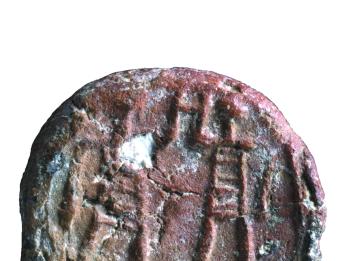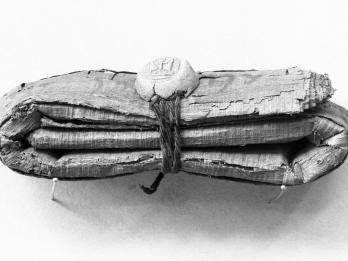Takkanot (Regulations)
The Jewish Community of Maḥla (Egypt)
17th Century
The Holy One, blessed be He, gave understanding, wisdom, knowledge, fear of sin, and generosity of soul to the eminent philanthropist, so that he should earn a good name and receive glory, his honor R. Shalom Levi—may his Rock preserve him, the son of the honorable rabbi, the wise and excellent Judah Levi, may he rest in peace, whose family name was Bakbesh—that he should be the gabbai [beadle] of the holy community of Maḥla. In our presence, the undersigned witnesses, the entire holy congregation has gathered together, the whole community, from great to small. They have concurred with good will, that his honor, the aforementioned R. Shalom, will serve as gabbai over them, to stand and serve in the house of the Lord, which is the synagogue of Maḥla, and to endeavor according to his ability to bring in a profit and avoid losses. He will act with good grace toward the congregation, as he will work for them and watch over them. He shall not scold them, make them angry, belittle their honor, or behave arbitrarily with them, but rather he will placate and honor each of them, small and great according to his honor and appropriate status. The aforementioned congregation also stipulated, agreed, and accepted upon themselves everything that the aforementioned gabbai, his honor R. Shalom Levi, shall decree and say, that he will be their agent, and will carry out the holy labor. The people will not criticize the work that he does, because he acts in faith [see 2 Kings 12:16]. The Lord will grant him success, and He will bless His people Israel with peace.
Furthermore, the gabbai, his honor R. Shalom Levi, and the congregation have agreed to give the ritual slaughterer, his honor R. Isaac Kohen the son of his honor R. Solomon Kohen whose family name is Barmon, may he rest in peace, every week the sum of forty-five muayyadi [a type of silver coin] as his salary. In exchange, he will slaughter and provide for them the meat of large animals, small animals, and fowl. He will also teach the local children the Bible and other subjects, in accordance with what he knows and has learned. Likewise, he will lead prayers on the Sabbaths and festivals and the High Holy Days, the New Year and the Day of Atonement. The gabbai, his honor R. Shalom Levi, shall serve as guarantor and payer of the forty-five muayyadi, which he shall give to the slaughterer every week, without the slaughterer having to ask for them, or to go to any trouble or effort to get them.
The congregation and the gabbai also stipulated with the slaughterer that he shall stay with them for six full and complete months, from the month of Adar I until the end of the month of Tammuz. In our presence, the undersigned, the slaughterer his honor R. Isaac Kohen, has fully admitted that he received from the congregation and from the gabbai his honor R. Shalom Levi the sum of eight grush, which are two hundred and forty muayyadi. The slaughterer, his honor R. Isaac Cohen, has committed to reimburse and give back the eight grush at the end of the six months, when the time of the promissory note is complete.
The gabbai, his honor R. Shalom Levi, has further obligated himself to collect forty-five muayyadi from the congregation, from each and every one of them, which is the share that they have taken upon themselves with good will. Anything missing from the forty-five muayyadi, the gabbai, his honor R. Shalom Levi, has agreed with good will to pay in full from the community fund, the charity fund. The congregation has also stipulated with the gabbai, his honor R. Shalom, and the gabbai has accepted this condition with good will, that as long as this promissory note is valid, which is six months, everything he gives and lays out and loses, perish the thought, during these six months, with regard to the slaughterer alone, the gabbai, his honor R. Shalom Halevi, has obligated and taken upon himself with good will that he cannot collect nor claim any of it from the congregation, not even a single farthing. Even if—perish the thought—it amounts to the loss of twenty grush, the gabbai has no claim against the congregation in any way at all, except if some libel is brought against the synagogue and the congregation, perish the thought. In such a situation, the entire congregation is obligated to stand united together as one band to support, provide assistance, and help the gabbai. This includes giving him, each and every one, any funds they can afford, in accordance with the blessing of the Lord upon him, and which the Lord has delivered into his hand [see Exodus 21:13].
The congregation and the gabbai and slaughterer have agreed among themselves, that if any of them should violate these conditions, he is fully obligated to give to the group that stands before him the sum of five grush as a fine, without compromise. The severity and validity of this note is like the severity and validity of all documents as properly practiced among the Jews, according to the law of the sages of eternal blessed memory. It does not depend on any condition, but rather it applies with all the validity of document written by a court scribe, without any subterfuge at all, and any basis for all appeals is rescinded, in accordance with the opinion of the Rashba [Solomon Ibn Adret (1235–1310)].
The first day of Adar I in the year 5432 of Creation [1672].
It shall remain in the hand of the gabbai and in the hand of the congregation and in the hand of the slaughterer, to serve as proof and as a document that provides rights. We have signed our names here in Maḥla, which is within the borders of Egypt, on the bank of the Nile, and all its contents are confirmed, clear and established.
Credits
Published in: The Posen Library of Jewish Culture and Civilization, vol. 5.




